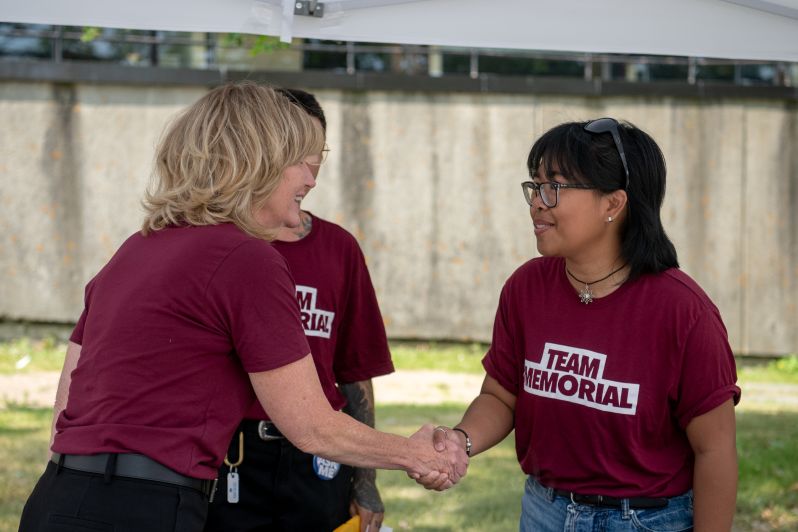Holding space for the past and the future

As I begin my tenure as president and vice chancellor of Memorial University, Newfoundland and Labrador– an institution that honours the past, serves the present, and will continue to shape the future – I’ve been thinking about leadership and what it takes to build and sustain trust.
Beyond their sense of vision, the leaders I admire most ask nuanced and tough questions, embrace respectful dialogue and vigorous debate, see possibilities others overlook, lead with passion, energy and a sense of purpose, and choose to act in service to others.
These are people who know that progress starts with the courage to sit in complexity.
Complexity
William Perry’s Scheme of Intellectual and Ethical Development(1970) holds that most learners (not just university students) traverse developmental stages related to how they engage or perceive knowledge. The first stage is characterized by a belief that all problems are solvable, and that there are right/wrong answers to every question.
I have a vivid memory of sitting in a first-year history class and being asked to reconcile opposing views – both written by ‘experts’– on the same topic. I remember the discomfort of trying to discern which one was right versus wrong. This exemplifies the stage of dualism.
Over time and with an appropriate balance of challenge and support, however, students come to accept that not all problems are solvable, that knowledge and values are dependent on context, and that facts and opinion are not always one and the same. This characterizes Perry’s stages of multiplicity, relativism and commitment.
Higher education, done well, propels this development; fueled by good pedagogy, students evolve to see truth as layered, messy, and living in the space between opposing ideas. The teaching, research and community engagement that happens on university campuses doesn’t collapse uncertainty into certainty; it builds a person’s capacity to hold it. Within and beyond our classrooms, learners weigh evidence, see the world through the lived experiences of others, and stay open-- even when they feel defensive or unsure.
I fear these capacities have diminished over time, which is particularly consequential at this moment of global conflict and polarization. Democracy and citizenship demand critical thinking, respectful debate and empathy. Too often, we are asked to choose sides as though two things can’t be true.
If the future depends on citizens’ capacity to move from dualism to commitment, the role of the university has never been more critical.
Vibrancy and Viability
I’ve dedicated my career to the post-secondary sector because I have an unwavering confidence in its ability to foster personal, economic and social transformation. My experience has cemented one universal truth: foundational to every institution’s success is its academic quality and an exceptional student experience. To deliver these commitments, our learning community must be both viable andvibrant.
A university that isn’t financially viable can’t sustain its mission. A university without intellectual, cultural, and human vibrancy may survive on paper, but will be hollow at its core.
Again, two things can be true. I reject that viability and vibrancy are competing forces or mutually exclusive.
Our Shared Purpose
As public debate grows around the role and impact of post-secondary institutions, I find myself reflecting on the book, Moral Ambition, by Rutger Bregman (2025). He argues that the measure of success isn’t what we accumulate, but what we contribute—specifically in relation to tackling global challenges. Bregman talks about impact in relation to the people we serveand about success as a measure of societal benefit.
That resonates with me, particularly as I begin a new chapter at Memorial, a university born in tribute, committed to service and leading with purpose into the future. It aligns with a quote I love from Thornstein Veblen (1918), who described the university’s purpose as “… the cultivation and care of the community’s highest aspirations and ideals”.
For 100 years, Memorial has delivered personal and social outcomes by holding space for complexity and the co-existence of seemingly opposite truths. We will leverage that experience as we move forward to— simultaneously:
- Honour tradition and evolve for the future.
- Protect our past and take bold risks to reimagine what’s next.
- Prepare students for meaningful work and responsible citizenship.
This is Our Moment
This is a time of unprecedented disruption for post-secondary education across Canada. I believe our next chapter will be written by those who are bold enough to ask difficult questions, open and empathetic enough to listen across lines of difference, and courageous enough to lead with purpose.
The choices we make now — about our purpose, our values, and our priorities — will shape Memorial University’s next 100 years.
This is our moment. Together, we will architect this great university’s future.